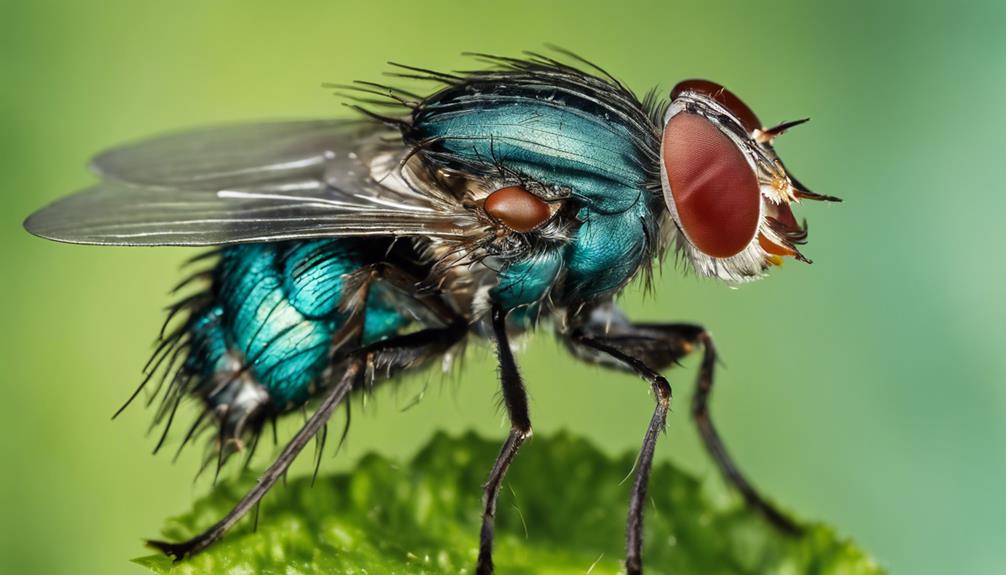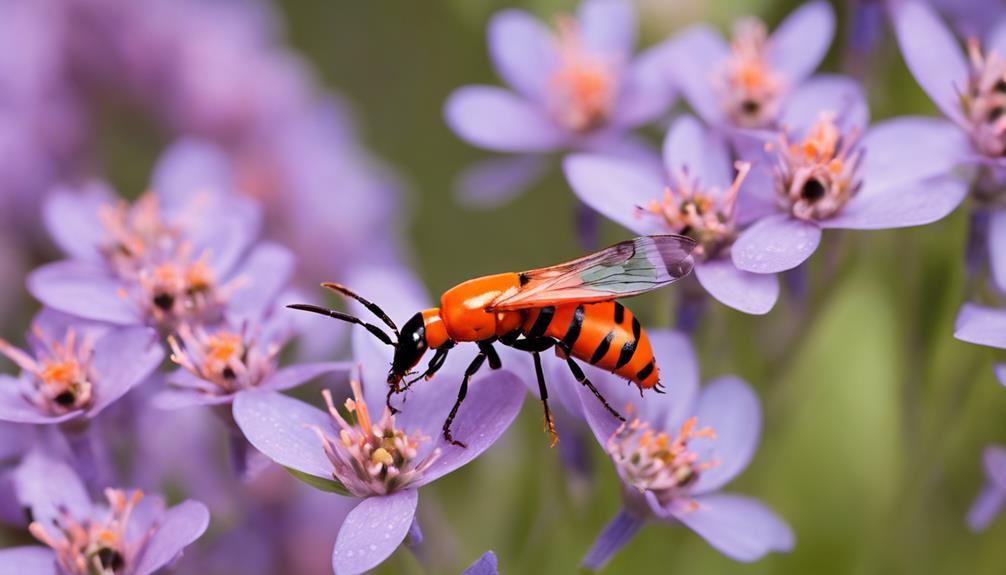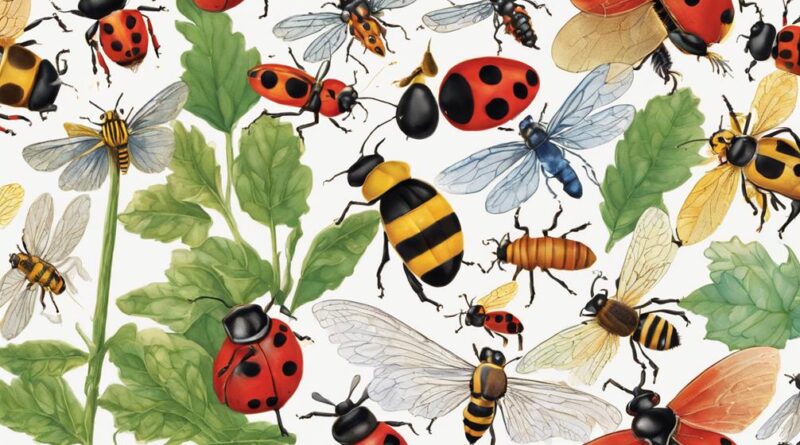9 Best Insects Beneficial for Your Herb Garden
This post may contain affiliate links which means I may receive a commission for purchases made through links. As an Amazon Associate, I earn from qualifying purchases. Learn more on my Private Policy page.
Benefit your herb garden by welcoming ladybugs, lacewings, hoverflies, praying mantises, ground beetles, parasitic wasps, tachinid flies, minute pirate bugs, and soldier beetles. Ladybugs devour aphids and mites, aiding in pollination and reducing the need for pesticides. Lacewings undergo metamorphosis, preying on aphids and caterpillars while contributing to pest control. Hoverflies diligently pollinate, with their larvae consuming herbivorous pests. Praying mantises are stealthy hunters blending into gardens, aiding in pest control. Ground beetles are night warriors controlling common pests. Consider these insects for a balanced ecosystem and healthier herbs.
Ladybugs
Ladybugs are highly effective predators in controlling aphid populations in herb gardens. These fascinating insects aren't only known for their bright red or orange wings with black spots but also for their important role as natural pest control agents. Ladybugs feed on aphids, mites, and other soft-bodied insects, making them a valuable asset in maintaining a healthy herb garden ecosystem.
In addition to their prowess in pest control, ladybugs also serve as pollinators. While not as efficient as bees, they do play a role in pollinating flowers. By attracting ladybugs to your garden, you aren't only safeguarding your herbs from harmful pests but also aiding in the pollination process, which is essential for the reproduction of many plant species.
One of the key benefits of attracting ladybugs to your garden is the reduction of the need for chemical pesticides. These beneficial insects can help keep pest populations in check, reducing the reliance on harmful chemicals that can have adverse effects on the environment and human health. By creating a welcoming environment for ladybugs through the use of companion plants, like dill and fennel, and avoiding the use of pesticides, you can harness the power of these tiny predators to maintain a thriving herb garden naturally.
Lacewings
Lacewings, also known as aphid lions, are predatory insects that are valuable assets in maintaining a balanced ecosystem in herb gardens. These delicate insects play a crucial role in controlling pests and promoting plant health. Here are three fascinating aspects of lacewings that make them essential allies in your garden:
- Lacewings Life Cycle: Lacewings undergo complete metamorphosis, consisting of four stages: egg, larva, pupa, and adult. The eggs are typically laid near aphid colonies or other prey, ensuring a readily available food source for the emerging larvae. Lacewing larvae, often called aphid lions due to their voracious appetite for aphids, caterpillars, and other soft-bodied insects, are the primary hunters during this stage. They're equipped with long, sickle-shaped mandibles that they use to pierce and suck out the fluids of their prey.
- Lacewings Natural Predators: Lacewings face threats from various predators themselves, including birds, spiders, and some insects. However, they've developed defense mechanisms such as their green coloring, which acts as camouflage among foliage, helping them evade detection. Additionally, lacewing larvae often cover themselves in debris or the remains of their prey for further protection.
- Beneficial Impact: Lacewings not only help control pest populations but also aid in pollination as adults. Their diet primarily consists of harmful insects like aphids, mites, and small caterpillars, making them an invaluable asset in maintaining a healthy herb garden ecosystem. By attracting lacewings to your garden, you can reduce the need for harmful pesticides while promoting a more sustainable and balanced environment.
Hoverflies
Hoverflies, also known as flower flies, are valuable pollinators and predators in herb gardens, contributing to ecosystem balance and plant health. These fascinating insects are often mistaken for bees due to their yellow and black striped bodies, but a closer look reveals their distinctive large, compound eyes and compact, hover-like flight patterns. Hoverflies are beneficial allies in herb gardens due to their dual role as pollinators and predators.
Hoverflies are vital pollinators, aiding in the reproduction of herb plants by transferring pollen from one flower to another. Their feeding behavior involves visiting multiple flowers in a short span of time, unintentionally pollinating them as they forage for nectar and pollen. This pollination process is crucial for herb plants to produce seeds and propagate effectively.
In terms of predation, hoverfly larvae are voracious consumers of aphids, caterpillars, and other herbivorous pests that can damage herb plants. The hoverfly lifecycle begins with eggs laid near aphid colonies, where the emerging larvae feed on these soft-bodied pests before pupating and transforming into adult hoverflies. Their habitat spans diverse environments, but they're commonly found in herb gardens due to the abundance of nectar-rich flowers and prey insects.
Praying Mantises
Praying mantises, known for their distinctive elongated bodies and powerful forelegs used for grasping prey, are formidable predators in herb gardens, playing a crucial role in controlling insect populations.
- Camouflage Masters: Praying mantises are experts at blending into their surroundings, using their green or brown coloration to mimic leaves or twigs. This camouflage allows them to ambush unsuspecting insects that come too close.
- Patient Predators: These insects exhibit a fascinating hunting technique characterized by their motionless stance with raised forelegs, waiting for prey to come within striking distance. Their patience and stealth make them efficient hunters in herb gardens.
- Intricate Mating Rituals: Praying mantises engage in elaborate courtship behaviors. In some species, females may even engage in sexual cannibalism, consuming the male after mating. This behavior, although macabre, is thought to provide additional nutrients to the female for egg development.
Praying mantises aren't only beneficial for herb gardens due to their pest control abilities but also serve as intriguing creatures to observe with their unique camouflage techniques and complex mating rituals. Appreciating these aspects of praying mantises can enhance your gardening experience while naturally managing insect populations in your garden.
Ground Beetles
Ground beetles, known for their voracious appetites and nocturnal hunting behavior, are valuable predators in herb gardens, contributing to natural pest control mechanisms. These insects are efficient natural predators that play a crucial role in maintaining the balance of herb garden ecosystems. With their diverse diet, ground beetles help control populations of various pests that can damage your precious herbs.
One key benefit of ground beetles is their effectiveness in controlling common herb garden pests like caterpillars, slugs, and aphids. Their voracious appetites make them formidable hunters, preying on these pests during the night when many other beneficial insects aren't active. By keeping pest populations in check, ground beetles help prevent damage to your herbs, promoting healthier growth and higher yields.
Their nocturnal habits allow ground beetles to complement the work of other beneficial insects that may be more active during the day. This continuous surveillance and predation on pests contribute significantly to the overall pest control strategy in herb gardens. By fostering a diverse community of natural predators like ground beetles, you can reduce the need for chemical pesticides and create a more sustainable and eco-friendly environment for your herbs to thrive.
Parasitic Wasps
Parasitic wasps, known for their specialized reproductive behavior, are crucial allies in the battle against herb garden pests. These tiny insects play a vital role in controlling pest populations, making them invaluable assets for your herb garden. Here are three fascinating facts about parasitic wasps that demonstrate their importance in wasp control and pest management:
- Targeted Approach: Parasitic wasps are masters of precision when it comes to pest management. Unlike other predators that consume a wide range of insects, these wasps specifically target certain pests, such as aphids, caterpillars, and beetle larvae. By parasitizing these pests, they help keep their populations in check without causing harm to beneficial insects.
- Reproductive Strategy: One of the most intriguing aspects of parasitic wasps is their reproductive strategy. Instead of simply preying on pests, female parasitic wasps lay their eggs inside the bodies of host insects. Once the eggs hatch, the larvae feed on the host from the inside, eventually leading to the host's demise. This unique approach ensures that the pest population is effectively controlled.
- Natural Pest Control: By harnessing the power of parasitic wasps in your herb garden, you can establish a natural and sustainable method of pest control. These wasps work tirelessly to seek out and parasitize pest insects, reducing the need for harmful chemical pesticides and promoting a healthier ecosystem in your garden.
Tachinid Flies

Having explored the role of parasitic wasps in herb garden pest control, another beneficial insect to consider is the tachinid fly. Tachinid flies are important predators in the ecosystem, particularly in herb gardens, where they play a crucial role in controlling pest populations.
Tachinid flies are medium-sized flies, often bristly in appearance, with a distinct pattern of dark and light colors on their bodies. They're easily identified by their habit of hovering over plants and flowers, searching for suitable hosts to lay their eggs. The lifecycle of a tachinid fly is fascinating; the female fly lays eggs on or inside the bodies of caterpillars, beetles, and other garden pests. Once the eggs hatch, the fly larvae feed on the host, eventually leading to its demise.
The benefits of tachinid flies in herb gardens are immense. By parasitizing harmful insects, they help to naturally control pest populations without the need for chemical pesticides. This biological control method isn't only effective but also environmentally friendly. However, tachinid flies do have predators of their own, including birds, spiders, and certain parasitic wasps. Despite this, tachinid flies remain a valuable asset in maintaining the balance of insect populations in herb gardens.
Minute Pirate Bugs
Minute pirate bugs, also known as Orius insidiosus, are tiny predatory insects that play a significant role in controlling pest populations in herb gardens. These garden guardians are a valuable asset in maintaining a healthy and thriving herb garden. Here are three reasons why you should welcome minute pirate bugs into your garden:
- Predatory Prowess: Minute pirate bugs are voracious predators, feeding on a wide range of garden pests such as aphids, spider mites, thrips, and small caterpillars. Their diet consists mainly of soft-bodied insects, making them effective natural enemies that help keep pest populations in check.
- Effective Pest Control: These small but mighty insects have a remarkable ability to hunt down and consume pests that threaten herb plants. By releasing minute pirate bugs into your garden, you can reduce the need for chemical pesticides while maintaining a balanced ecosystem.
- Diverse Habitat: Minute pirate bugs are adaptable insects that can thrive in various environments. They're commonly found in herb gardens, where they seek shelter in plant foliage and flowers. Providing a diverse habitat with a mix of plants can attract and support these beneficial insects in your garden.
Soldier Beetles

Soldier beetles, scientifically known as Cantharidae, are beneficial insects that contribute to the ecological balance and pest management in herb gardens. These slender, soft-bodied beetles aren't only valuable for their pollination services but also for their role as natural predators. Soldier beetles act as pollination partners by visiting flowers in search of nectar and pollen. As they move from bloom to bloom, they inadvertently transfer pollen, aiding in the fertilization process and promoting plant growth and reproduction.
In addition to their pollination benefits, soldier beetles are voracious predators of harmful garden pests. They prey on aphids, caterpillars, beetles, and other insects that can damage herb plants. Soldier beetles are particularly effective at controlling aphid populations, which are known for their destructive feeding habits. By consuming these pests, soldier beetles help to keep herb gardens healthy and thriving without the need for harmful pesticides.
When you spot soldier beetles in your herb garden, observe their interactions with the plants and other insects. Appreciate their diligent work as pollinators and natural predators. By attracting and supporting soldier beetles in your garden, you can create a balanced ecosystem where beneficial insects help maintain the well-being of your herb plants.
Frequently Asked Questions
Can These Insects Harm My Herb Garden Plants?
Insects that can harm your herb garden plants are a concern for many gardeners. By practicing effective pest control and prevention methods, you can minimize the damage caused by these harmful insects.
Utilizing companion planting techniques can also help deter pests and protect your herbs. Be sure to monitor your garden regularly for signs of infestation and take proactive measures to keep your plants healthy and thriving.
How Can I Attract These Beneficial Insects to My Garden?
To attract beneficial insects like ladybugs and lacewings to your garden, focus on plant diversity and companion planting. By planting a variety of herbs and flowers that attract these insects, you create a welcoming environment.
Additionally, consider using pheromone traps to lure in specific beneficial insects. Creating habitats such as bug hotels or providing water sources can also help maintain a population of these helpful creatures in your garden.
Do These Insects Require Any Special Care or Maintenance?
To maintain a healthy population of beneficial insects in your garden, it's crucial to provide a diverse habitat with plenty of food sources and shelter. By supporting these natural predators, you enhance the ecosystem's balance and reduce the need for chemical pest control.
The importance of biodiversity can't be overstated, as it creates a resilient environment where beneficial insects thrive and contribute to the overall health of your herb garden.
Are There Any Natural Predators of These Beneficial Insects?
Natural enemies play a crucial role in insect control by preying on beneficial insects. Predator-prey dynamics are complex, with some insects maintaining a delicate balance in the ecosystem.
Understanding the food sources of natural enemies can help manage their populations effectively. It's essential to promote a diverse habitat that supports both beneficial insects and their predators to maintain a healthy ecosystem in your herb garden.
Can I Purchase These Insects to Release in My Herb Garden?
You can purchase beneficial insects to release in your herb garden to help control unwanted insect populations naturally.
However, it's essential to consider the environmental impact and ethical concerns associated with introducing non-native species.
Before releasing any insects, research the specific control methods they offer and ensure they won't harm the local ecosystem.
Always prioritize sustainable and responsible practices when managing insect populations in your garden.
Conclusion
In conclusion, incorporating beneficial insects like ladybugs, lacewings, and hoverflies into your herb garden can help control pests and promote a healthy ecosystem. These insects are natural predators that can effectively manage unwanted pests without the need for harmful chemicals.
By attracting and supporting these beneficial insects, you can maintain a balanced environment that promotes the growth and vitality of your herbs. Consider introducing these insect allies to your garden for a more sustainable and thriving herb-growing experience.
